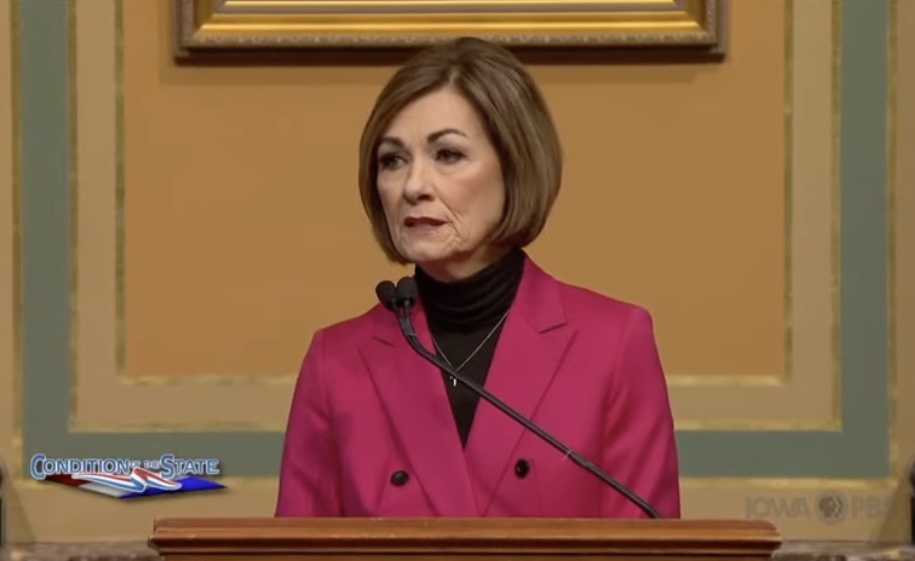Bruce Lear lives in Sioux City and has been connected to Iowa’s public schools for 38 years. He taught for eleven years and represented educators as an Iowa State Education Association regional director for 27 years until retiring. He can be reached at BruceLear2419@gmail.com
Often when a politician gives a speech, what’s not said speaks volumes. The details left out are as important or more important than what’s said.
That’s the case with Governor Kim Reynolds’ Condition of the State on January 14—especially when it comes to what she left out about public education.
Any critique of a presentation should also note the parts worth praising. Reynolds recognized how Iowans responded to the devastating floods and tornadoes last spring and summer. That was well done. She told the story of neighbors helping neighbors.
Also noteworthy was her announcement of plans to seek a $1 million grant for cancer research, since Iowa’s cancer rates are the second-highest in the country, and rising. That’s overdue.
But she left a lot unsaid about public education. Her speech reminded me of the brooding, silent, Governor John Dutton in the fifth season of Yellowstone. He said in his announcement speech, “If it’s progress you want, then don’t vote for me. I’m the opposite of progress.” But he didn’t explain how he defines “progress.”
Kim Reynolds is Iowa’s John Dutton.
Here’s what she left unsaid.
It’s no secret the governor wants to cut property taxes. But how she intends to do that is still a mystery. Republican legislative leaders have indicated that this is their highest priority, but Reynolds didn’t offer her vision of what that might look like. She also was strangely silent on what would replace the lost revenue.
Public schools are funded from a mix of local property taxes and state appropriations. Take one ingredient from that mix and it will be toxic for public schools. Cutting property taxes will be popular until it starts to shutter local schools. Funding for schools was originally tied to property taxes because that was a predictable and consistent source of revenue. Any substitute needs to provide the same kind of guarantees.
Reynolds bragged about signing the largest pay increase for teachers in the state’s history. (That was part of last year’s bill overhauling Area Education Agencies.) What she didn’t say: this raise wasn’t for all teachers. Initially it raised the minimum salary for beginning teachers to $47,500, provided they weren’t already earning that salary, and set a floor of $60,000 for teachers with at least twelve years of experience.
In the coming year the minimum salary for a first-year teacher will be $50,000 per year, and school districts will be required to pay at least $62,000 to teachers with twelve years of experience. There’s no automatic salary increase for teachers beyond the twelfth year, or for teachers who were already making more than the new floor. That means a lot of teachers will earn no raise or a very small increase.
Reynolds also didn’t tell the full story on her private school voucher program. Her “Education Savings Accounts” have created a two-tier publicly funded school system, separate and unequal.
We now know most of the new state funding to pay for private school tuition went to students already enrolled in private schools. It’s not “educational freedom” to provide public money to those who can already afford tuition costs. It’s welfare for the well-off.
The governor neglects to tell Iowans that many private schools raised tuition because that law didn’t restrict tuition hikes. There’s little overall accountability (and no state audit process) for how private schools use taxpayer money. She also didn’t mention that private schools are still free to reject students for any reason, even if the student was approved to use an Education Savings Account.
She was silent about the 42 counties in Iowa with no private school option. Most of those taxpayers are subsidizing private school for people living in more populous counties.
Reynolds praised Iowa’s boom in public charter schools. She didn’t mention that those are mostly popping up in urban and suburban areas, not rural Iowa.
Like Paul Harvey, Reynolds needs to “tell the rest of the story.” Iowans shouldn’t wake up some morning and be surprised by what the legislature passed, and the governor signed.
Editor’s note from Laura Belin: You can read the full text of the governor’s speech here, or watch the video here. The speech as delivered stuck very close to the prepared remarks.
Top image: Screenshot from Iowa PBS video of Governor Kim Reynolds delivering the Condition of the State address on January 14.


2 Comments
Cancer
In the State of the State speech, the Governor is wondering if our high rates of cancer are due to binge drinking. The other probable explanation, pollution and carcinogens from intensive agriculture, is not even mentioned.
Like Bruce writes, “Often when a politician gives a speech, what’s not said speaks volumes.”
Karl M Wed 15 Jan 9:55 PM
Governor Reynolds said nothing at all about water quality. How astonishing. *eyeroll*
I’m reminded of four decades ago, when Governor Branstad used to routinely mention “clean air and water” as two of Iowa’s virtues when he gave his Condition/State speeches. Of course Iowa conservationists knew there were serious water problems. But Iowa surface water quality was officially largely unknown. Meanwhile, according to informed rumor, the Iowa Farm Bureau and its allies were fighting hard behind the scenes to prevent, or at least delay, the creation of a state volunteer water-testing program like some other states already had.
Sure enough, Iowa’s water realities turned out to be extremely unpleasant. And seriously addressing that problem would not please Iowa’s Big Ag overlords. No wonder Governor Reynolds decided to ignore the issue and not harsh her Republican fan club’s buzz. How considerate of her.
PrairieFan Thu 16 Jan 12:57 AM